News
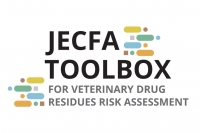
30/10/2024
FAO hosted a side event on the JECFA Toolbox at the 27th Session of the Committee on Residues of Veterinary Drugs in Foods (CCRVDF27). Vittorio Fattori and Markus Lipp, FAO, and Alan Chicoine, University of Saskatchewan, presented an overview of the toolbox and gathered feedback from participants. The recording of the event is available online.
The process used by the Joint FAO/WHO Expert Committee on Food Additives (JECFA) for assessing risks resulting from veterinary drug residues in food is based on sound scientific principles and procedures. For stakeholders and new JECFA experts to understand this process, FAO is finalizing...
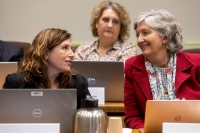
17/10/2024
The latest volume of the FAO JECFA Monographs has been published, containing residue evaluation of certain veterinary drugs prepared at the 98th meeting of the Joint FAO/WHO Expert Committee on Food Additives (JECFA), held from 20 to 29 February 2024 in Rome.
JECFA is an international scientific expert committee administered jointly by FAO and the World Health Organization (WHO). It has been meeting since 1956, to evaluate the safety of food additives, contaminants, naturally occurring toxicants and residues of veterinary drugs in food. The 98th JECFA meeting was convened specifically to consider residues of...
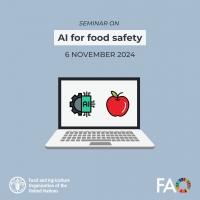
14/10/2024
A technical seminar on “Artificial Intelligence (AI) for food safety”, slated for 6 November 2024, will be held in Iran Room, FAO headquarters, as well as online, and registration is open now.
This hybrid event aims to explore the current state of a rapidly evolving technology, its benefits and drawbacks. The seminar takes its cue from the literature synthesis that FAO, in collaboration with the Wageningen Food Safety Research (WFSR) is compiling on the practical applications of AI in food safety management.
Responsible use of AI has the potential to play a critical role in various disciplines, including in the...
11/10/2024
A FAO mission to validate data on Djibouti’s food control system concluded yesterday, marking the final phase of a $6.4 million European Union-funded project that has already supported assessments in nine other African Union countries. Djibouti is the last of the 10 countries to undergo this comprehensive evaluation.
During the three-week validation mission, FAO technical experts visited various facilities, including oil and milk processing plants, slaughterhouses, warehouses, restaurants, and supermarkets in the city of Djibouti. They also conducted interviews with Competent Authorities and stakeholders from the Chamber of Commerce and various research centers to verify...
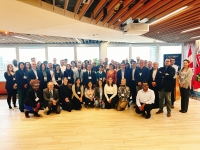
11/10/2024
Experts from the Food and Agriculture Organization of the United Nations (FAO) Agrifood Systems and Food Safety Division accompanied officials from the Department of Agriculture and Agri-Food Canada (AAFC) on a tour of the n!Biomachines facility, a Canadian subsidiary of German company The Cultivated B, located in Burlington, Canada.
This visit was in coordination with a one-day global stakeholder roundtable meeting organized by FAO and AAFC on the...
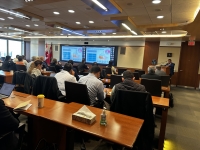
10/10/2024
On 10 October 2024, a total of 25 stakeholder presenters from various parts of the world gathered in Toronto, Ontario, Canada, for a global meeting on cell-based food and precision fermentation. The meeting welcomed approximately 60 participants, including representatives from various departments and agencies of the Government of Canada, to discuss various technical issues around foods derived from cell culturing and precision fermentation. The meeting was hosted by the Department of Agriculture and Agri-Food Canada (AAFC) and held at the Ontario Investment and Trade Centre. FAO Liaison Office for North America has also collaborated in this...

08/10/2024
FAO has published the meeting report of the 2023 Food Safety Foresight Technical Meeting, along with a series of video interviews and an infographic. The report explores three focus areas addressed at the meeting – plant-based food products, precision fermentation and 3D food printing.
The way we produce food puts enormous pressure on the world’s finite natural resources and contributes a third of global anthropogenic greenhouse gas emissions. Meanwhile, the growing global population is driving demand for increased food production, posing a challenge to stay within planetary boundaries.
To meet the demand for food while addressing...
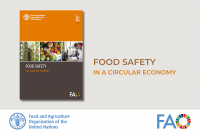
01/10/2024
Circular production promises vast benefits towards sustainability across all dimensions – economic, environmental and social. Yet, it also implies a significant departure from the linear “take-make-use-dispose” model of the current system.
Circular economies are critical to achieving the transformation needed for our agrifood systems to guarantee adequate food for all produced within the planetary boundaries. At the same time, this transformation requires adapting food safety policies and principles to ensure that food remains safe.
The FAO food safety foresight programme is actively working in this area and released a report, Food Safety in a...
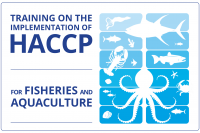
24/09/2024
A joint event organised and delivered by FAO’s Fisheries and Aquaculture and Food Systems and Food Safety Divisions including contributions from Codex Secretariat experts and technical experts.
The training event will take place online from 21 to 23 October 2024.
A thorough understanding of the hazards associated with fisheries and aquaculture products is crucial for implementing an effective HACCP system. The knowledge...
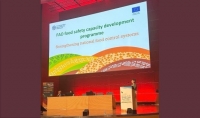
18/09/2024
At the IUFoST World Congress on Food Science and Technology, FAO presented its ongoing efforts in improving national food control systems using the FAO/WHO Food Control System Assessment Tool. The tool, developed jointly by FAO and the World Health Organization, provides a structured, transparent, and evidence-based method to assess food control systems across the entire food chain, from production to consumers, enabling countries to implement targeted strategies for measurable and sustainable improvements.
The session emphasized the critical role of science and risk analysis in support of food control systems, as highlighted by the tool. Based on Codex Alimentarius principles, one...
Stay up to date and connect to our RSS feed!
